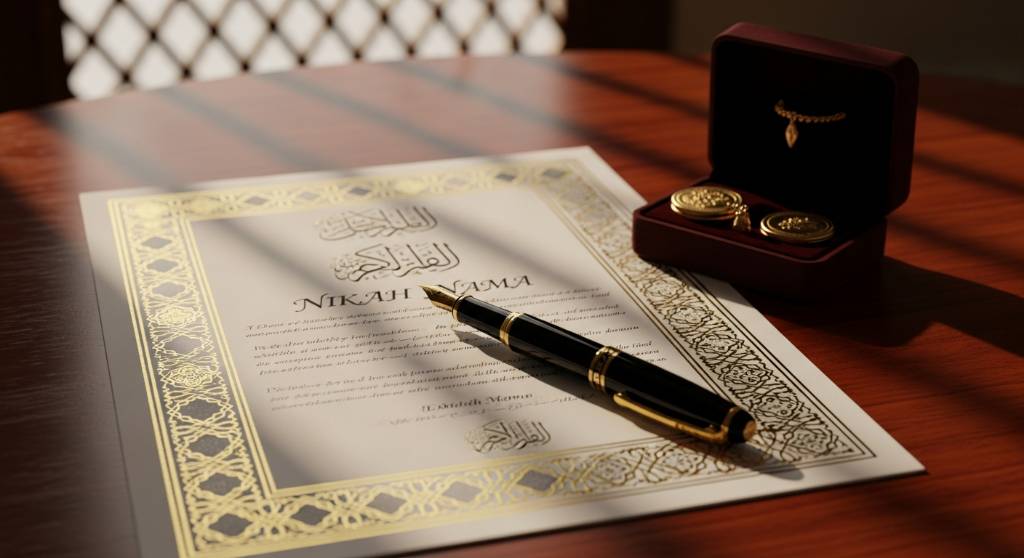Your Guide to the Nikah: The 3 Essential Pillars of an Islamic Marriage
Published on August 1, 2025

The Islamic wedding ceremony, known as the Nikah (نِكَاح), is a beautiful and sacred event. While cultural celebrations can be elaborate and diverse, the core religious ceremony is remarkably simple and profound. It's not just a ritual; it's a solemn contract between a man and a woman to live together as husband and wife.
For a Nikah to be valid in the eyes of Islam, certain essential conditions, or pillars (arkan), must be met. If you're planning your Nikah or simply wish to understand the process better, here are the three fundamental pillars that form the foundation of an Islamic marriage contract.
What is a Nikah? The Islamic Marriage Contract
Before diving into the pillars, it's important to understand that the Nikah is a legal and social contract. It's a formal agreement that protects the rights of both the husband and the wife. The beauty of this contract lies in its clarity, mutual consent, and public declaration, ensuring that the union is recognized by the community and blessed by Allah (SWT).
Let's break down the essential conditions for a valid Nikah.
The 3 Core Pillars of a Valid Nikah
1. The Offer and Acceptance (Ijab-wa-Qabul)
This is the very heart of the Nikah ceremony. It is the verbal contract that must take place in a single session.
- The Offer (Ijab - إِيجَاب): This is the proposal. It is formally made by the bride's guardian (Wali) or the bride herself (depending on the school of thought) saying something like, "I have given my daughter/myself to you in marriage in accordance with the laws of Islam."
- The Acceptance (Qabul - قَبُول): This is the clear and unequivocal acceptance from the groom. He must respond immediately and without ambiguity, saying something like, "I have accepted her/your daughter in marriage."
Key Points:
- Consent is Crucial: Both the bride and groom must have given their free and willing consent to the marriage. Forced marriage is strictly forbidden in Islam.
- Clarity is Key: The words used must clearly indicate marriage and cannot be in the past or future tense (e.g., "I will marry..."). They must be in the present to signify the immediate effect of the contract.
- One Sitting: The offer and acceptance must occur in the same gathering (majlis) without any significant interruption or delay between them.
2. The Presence of Witnesses (Shahadah)
An Islamic marriage cannot be a secret affair. The presence of witnesses serves to validate the contract, make it public, and protect both parties from slander or future disputes. The requirement for witnesses is a fundamental condition for the Nikah to be valid.
According to the majority of Islamic scholars (particularly in the Hanafi school of jurisprudence), the requirement for witnesses is:
- Two adult, sane Muslim men.
OR
- One adult, sane Muslim man and two adult, sane Muslim women.
The wisdom behind two female witnesses being equivalent to one male witness in contractual matters is often traced back to Quranic guidance on financial transactions (Surah Al-Baqarah 2:282), and this principle is extended by many scholars to the marriage contract. The primary goal is to ensure the marriage is publicly known and can be legally verified by credible individuals.
3. The Bridal Gift (Mahr or Mohor)
The Mahr (مَهْر), also commonly known as Mohor, is a mandatory gift from the groom to the bride. It is a right of the bride and a symbol of the groom's honor, respect, and financial commitment to his new wife.
Important Clarifications:
- It is NOT a "bride price." The Mahr is not given to the bride's family in exchange for her. It is her exclusive property to keep and use as she wishes.
- It can be money, property, jewelry, or any other valuable asset. It can be paid immediately (mu'ajjal) or deferred to a later, agreed-upon date (mu'akhkhar).
What if the Mahr Amount Isn't Specified?
This is where a crucial rule comes into play. For the contract to be valid, the Mahr must be part of the agreement.
The Mahr amount should be spoken clearly and agreed upon. This prevents any confusion or disagreement later on. Both families should discuss and settle on an amount that is reasonable and not an excessive burden on the groom.
If not specified, a default is used. In the case where a Nikah is performed without a specific Mahr amount being mentioned, the marriage is still valid. However, the wife automatically becomes entitled to the "Mahr al-Mithl" (the Mahr of her peers).
This default Mahr is determined by looking at the Mahr received by her female relatives of similar social, economic, and educational standing. As you mentioned, this is often calculated based on:
- Her elder sister's Mahr.
- Her paternal aunt's Mahr.
- The Mahr of other female cousins on her father's side.
This practice ensures the bride is given a fair and just Mahr that honors her status, even if it was overlooked during the ceremony.
Other Important Elements
While the three conditions above are the absolute pillars, other elements are also vital:
- The Wali (Guardian): For the bride, the presence and consent of her male guardian (usually her father) is considered a condition for a valid Nikah by the majority of scholars.
- The Khutbah-tun-Nikah: This is a short sermon that is highly recommended (Sunnah) to be recited before the contract. It includes praises of Allah, blessings upon the Prophet Muhammad (PBUH), and verses from the Quran about piety and marital responsibility.
Conclusion
The Islamic marriage ceremony is built on a foundation of mutual consent, public declaration, and clear rights. By fulfilling these three simple yet profound conditions—the offer and acceptance, the presence of witnesses, and the agreement of the Mahr—a couple enters into a sacred bond that is recognized, protected, and blessed. It is a beautiful testament to the clarity and justice embedded in Islamic law.

